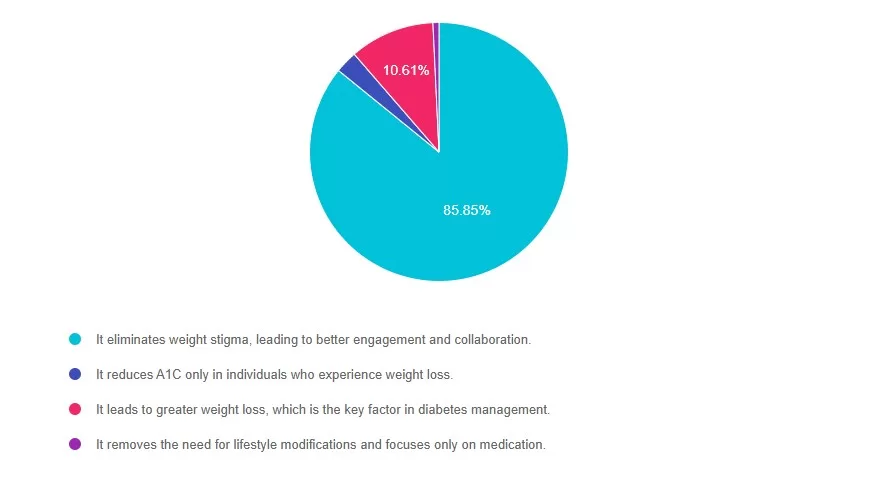For last week’s practice question, we quizzed participants on weight inclusive diabetes care. 85% of respondents chose the best answer. We want to clarify and share this important information, so you can pass it on to people living with diabetes and your colleagues, plus prepare for exam success!
Before we start though, if you don’t want any spoilers and haven’t tried the question yet, you can answer it below: Answer Question

Question:
How does weight-inclusive care improve clinical outcomes in diabetes management?
Answer Choices:
- It eliminates weight stigma, leading to enhanced engagement and collaboration.
- It reduces A1c only in those who experience weight loss.
- It leads to greater weight loss, which is the key factor in diabetes management.
- It removes the need for lifestyle modifications and focuses only on medication.

Getting to the Best Answer
If you are thinking about taking the certification exam, this practice test question will set you up for success. Test writers anticipate possible answers based on the details in the question. They will wave those “juicy answers” right under your nose. Your job is to weed through the particulars, pluck out the most important elements and choose the BEST answer.
Answer 1 is correct. 85% chose this answer, “It eliminates weight stigma, leading to better patient engagement and adherence to treatment.” Studies suggest that weight stigma in healthcare leads to worse health outcomes, as patients in larger bodies are more likely to delay care or avoid medical visits altogether due to fear of judgment. A weight-inclusive approach fosters trust and encourages long-term behavior change, which ultimately improves glycemic control and patient well-being.
Answer 2 is incorrect. 2% of you chose this answer, “It reduces A1c only in patients who experience weight loss.” Research has consistently shown that health-promoting behaviors—like increasing fiber intake and engaging in regular movement—can improve blood sugar levels independent of weight loss.
Answer 3 is incorrect. About 10% of respondents chose this, “It leads to greater weight loss, which is the key factor in diabetes management.” While weight loss is often associated with improved health markers, the key drivers of better outcomes in diabetes care are sustainable habits, not weight change itself. Many individuals improve their metabolic health and blood sugar levels through consistent health behaviors, regardless of changes in body size. The focus should be on sustainable, evidence-based interventions rather than weight as an outcome.
Finally, Answer 4 is incorrect. 1% chose this answer, “It removes the need for lifestyle modifications and focuses only on medication.” Medications like metformin and GLP-1 receptor agonists are valuable tools in diabetes management, but they work best when combined with behavior-based interventions. A weight-inclusive model does not dismiss the role of medication; rather, it ensures that patients receive comprehensive, stigma-free care that includes sustainable lifestyle adjustments.
We hope you appreciate this week’s rationale! Thank you so much for taking the time to answer our Question of the Week and participate in this fun learning activity!
by Jessica Jones, MS, RD, CDCES, CEO and Co-founder of Diabetes Digital, a virtual nutrition counseling platform for people with diabetes and prediabetes
Want to learn more about this question?
Weight-Inclusive Diabetes Care: Turning Compassion into Practical Tools
by Jessica Jones, MS, RD, CDCES
This session provides healthcare providers with actionable strategies to integrate weight-inclusive care into diabetes management practices, focusing on improving outcomes through respect for body diversity and individual autonomy. Weight stigma is a well-documented barrier to effective care, contributing to poorer glycemic control, disordered eating, and care avoidance. By shifting from a weight-focused approach to one aligned with Health at Every Size (HAES®), providers can foster trust, enhance participant engagement, and support sustainable health behaviors.

Jessica Jones, MS, RD, CDCES, will share evidence-based insights on mitigating weight stigma and applying HAES-aligned strategies in practice. Participants will learn how to build rapport, set realistic nutrition goals, and implement interventions that prioritize blood sugar management, joyful movement, and intuitive eating. This session equips providers with tools to deliver compassionate, person-centered care, improving both clinical outcomes and the provider-participant relationship..
Course topics:
- Foundations of weight-inclusive diabetes care: overview and evidence
- Shifting perspectives: building trust and redefining success
- Practical tools for sustainable blood sugar management
Instructor: Jessica Jones, MS, RD, CDCES, CEO and Co-founder of Diabetes Digital

Jessica Jones, MS, RDN, CDCES, is a nationally recognized Registered Dietitian Nutritionist and Certified Diabetes Care & Education Specialist committed to making nutrition education accessible to everyone. As the CEO and co-founder of Diabetes Digital, Jessica has been pivotal in developing an innovative telehealth platform that provides tailored nutrition counseling for individuals with diabetes and prediabetes. Additionally, she co-hosts the Diabetes Digital Podcast, engaging listeners with thoughtful conversations on managing diabetes.
With over a decade of clinical experience, Jessica has contributed significantly to the field through her co-authorship of the “28-Day Plant-Powered Health Reboot” cookbook and “A Diabetes Guide to Enjoying the Foods of the World.” She also wrote the Diabetes Chapter for the Food and Nutrition Care Manual Textbook and regularly shares her insights as a columnist for SELF magazine.
As a co-founder of Food Heaven, an online platform and podcast with more than 5 million downloads, she offers essential resources on cooking, intuitive eating, and embracing body respect. Jessica’s contributions have been celebrated in prominent publications, including Oprah Magazine, Women’s Health, The Food Network Magazine, SELF Magazine, the Huffington Post, and Bon Appetit. She lives in Sacramento, CA with her husband and “spirited” Maltese Shih Tzu puppy, Poppy.









